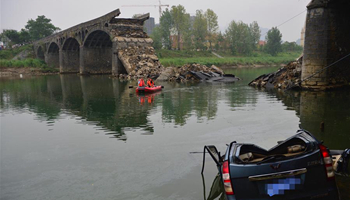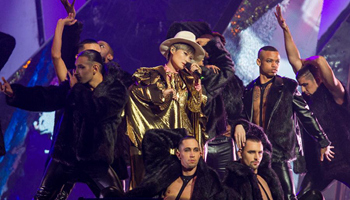by Edgardo Loguercio
BRASILIA, Aug. 22 (Xinhua) -- The impeachment process into Brazil's suspended president Dilma Rousseff, will enter a decisive phase this week as her trial begins in the Senate.
The timeline for the event was announced last week by the president of the Supreme Court (STF), Ricardo Lewandowski, who will oversee the trial.
Rousseff stands accused of seeking to hide public budget deficits through fiscal irregularities, such as delaying loan payments to public banks and ordering additional loans without congressional approval.
Rousseff was temporarily suspended for up to 180 days on May 12 and her vice president Michel Temer took over the presidency on an interim basis.
A two-thirds majority, 54 out of 81 senators, is needed to fully remove her from office.
Should Rousseff be impeached, Temer would complete her mandate until the end of 2018 and she would be ineligible to stand for public office for eight years.
If not, she will return to the presidency immediately and the process against her will end.
The first part of the process on Aug. 25-26 will be given over to the testimony of witnesses called by the prosecutors, Miguel Reale Junior, Janaina Paschoal and Helio Bicudo, and Rousseff's defense team, led by former Justice Minister, Jose Eduardo Cardozo.
The prosecution will call two witnesses, Julio Marcelo de Oliveira, a public official from the federal accountability office (TCU) who made the allegations against Rousseff, and Antonio Carlos Costa D'Ávila, the chief auditor of the TCU.
The defense has presented six witnesses, the maximum permitted. These include Rousseff's former planning minister Nelson Barbosa, her former budget secretary Esther Dweck, a leading economist Luiz, Gonzaga Belluzzo, the former political investment secretary, Gilson Bettencourt, the former executive secretary of the ministry of education, Luiz Claudio Costa, and a law professor from the Federal University of Rio de Janeiro, Geraldo Prado.
The declarations of each witness will be heard individually, followed by three minutes allotted for questions from each senator and three minutes for answers.
On Aug. 29, Rousseff will take the stand in her own defense. She will have 30 minutes to make her case, before being interrogated by the president of the Supreme Court, the senators, and the lawyers for the prosecution and defense.
Each senator will have five minutes to ask question while Rousseff will have no time limit to answer. She is also permitted to remain silent on any questions.
After Rousseff's participation, the prosecution and defense will have 90 minutes to make their closing statements and will be allowed a rebuttal.
On Aug. 30, each senator will have 10 minutes to speak on the entire process, after which Lewandowski will read a summary of the trial, with the main arguments from the prosecution and defense.
Two senators favorable to Rousseff's impeachment and two senators against it will then have five minutes each to give their recommendations for the final vote.
If time allows, the vote will take place on Aug. 30 and if not on Aug. 31.
The bloc in favor of impeachment is confident of gaining the 54 votes necessary, since a vote taken two weeks ago into whether there was enough evidence to try Rousseff saw 59 votes in favor.
In an address in Brasilia on Aug. 16, Rousseff repeated her claim that she had been formally accused of no crime and that her removal from office would be "a coup".
"My return to the presidency, upon decision of the Senate, would show a democratic, lawful state and would contribute decisively to a new and promising political reality," she read.
According to Rousseff, the country needs a new institutional form of politics which overcomes "the fragmentation of parties, makes campaign financing moral...and give more power to the voters."
She is expected to return to this message during the trial to seek to convince undecided senators to vote against her impeachment.










